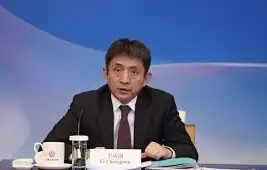China's New Trade Negotiator: Who is Li Chenggang Amid US Tariff Tensions?
New Appointment in China's Trade Negotiation Team

Beijing: On Wednesday, China appointed Li Chenggang as its new chief international trade negotiator, a move that comes amid ongoing tariff disputes with the United States.
Li takes over from Wang Shouwen, who was involved in the trade discussions leading to the 2020 agreement between China and the US.
The trade relationship between these two economic giants has been strained, with both nations imposing increasing tariffs on each other's products. Currently, China faces a staggering 145% tariff on its exports to the US, while other nations have received a temporary 90-day exemption from many duties.
Earlier in the day, China reported a 5.4% annual growth rate for its economy in the first quarter, buoyed by robust export performance. However, analysts predict a significant slowdown in the upcoming months as new tariffs on US imports from China come into effect.
Exports played a crucial role in achieving China's 5% annual growth target for 2024, which remains unchanged for this year.
In retaliation, Beijing has imposed 125% tariffs on American goods, while emphasizing its commitment to maintaining open markets for trade and investment.
Although these tariffs may exert short-term pressure on China's economy, they are not expected to hinder long-term growth, according to Sheng Laiyun, a spokesperson for the National Bureau of Statistics.
The rationale behind the change in negotiators remains unclear, but Chinese officials have indicated that the country has various strategies to counter US actions, including leveraging its vast domestic market of 1.4 billion consumers and strengthening ties with Europe and developing nations. However, with domestic consumption still struggling, replacing the US consumer will be challenging.
Additionally, China has tightened export controls on rare earth elements, which are essential for high-tech applications, aerospace, and defense industries.
Before his current role, Li Chenggang served as China's ambassador to the World Trade Organization for approximately four and a half years, where he represented Beijing in its tariff disputes with the US.
His previous experience also includes serving as the deputy permanent representative to the Chinese delegation at the United Nations in Geneva and other international organizations in Switzerland.
Li holds a bachelor's degree in law from Peking University and a master's degree in the economics of law from the University of Hamburg.
